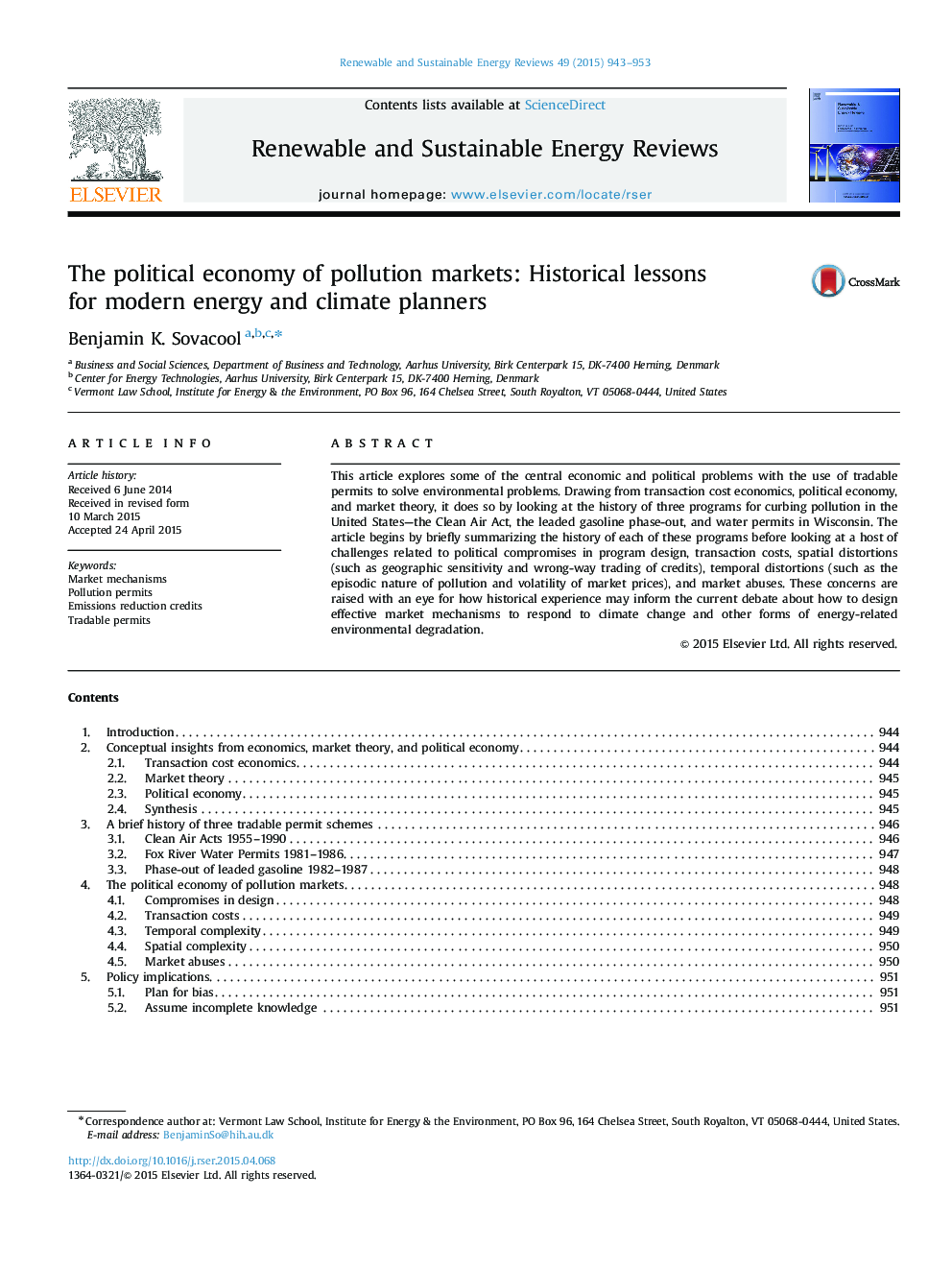| کد مقاله | کد نشریه | سال انتشار | مقاله انگلیسی | نسخه تمام متن |
|---|---|---|---|---|
| 8116937 | 1522336 | 2015 | 11 صفحه PDF | دانلود رایگان |
عنوان انگلیسی مقاله ISI
The political economy of pollution markets: Historical lessons for modern energy and climate planners
ترجمه فارسی عنوان
اقتصاد سیاسی بازار آلودگی: درس های تاریخی برای برنامه ریزان انرژی و مسائل مدرن
دانلود مقاله + سفارش ترجمه
دانلود مقاله ISI انگلیسی
رایگان برای ایرانیان
کلمات کلیدی
مکانیزم های بازار، مجوز آلودگی، اعتبار کاهش انتشار گازهای گلخانه ای، مجوزهای تجاری
ترجمه چکیده
این مقاله برخی از مشکلات اقتصادی و سیاسی مرکزی را با استفاده از مجوزهای قابل معامله برای حل مشکلات زیست محیطی مورد بررسی قرار می دهد. با توجه به هزینه هزینه های معامله، اقتصاد سیاسی و نظریه بازار، این امر با نگاهی به تاریخچه سه برنامه برای کاهش آلودگی در ایالات متحده - قانون هوای پاک، حذف بنزین سرب و مجوز آب در ویسکانسین انجام می شود. مقاله به طور خلاصه خلاصه ای از تاریخ هر یک از این برنامه ها را پیش از بررسی چندین چالش مربوط به سازش های سیاسی در طراحی برنامه، هزینه های معامله، اعوجاج های فضایی (مانند حساسیت جغرافیایی و تجارت اشتباه اعتبارات)، اعوجاج های زمانی ( مانند ماهیت اپیزودیک آلودگی و بی ثباتی قیمت های بازار) و سوء استفاده از بازار است. این نگرانی ها با توجه به اینکه چگونه تجربه های تاریخی ممکن است بحث های جاری در مورد چگونگی طراحی مکانیزم های موثر بازار برای پاسخ به تغییرات آب و هوایی و سایر اشکال تخریب زیست محیطی مربوط به انرژی را در اختیار داشته باشد، مطرح می شود.
موضوعات مرتبط
مهندسی و علوم پایه
مهندسی انرژی
انرژی های تجدید پذیر، توسعه پایدار و محیط زیست
چکیده انگلیسی
This article explores some of the central economic and political problems with the use of tradable permits to solve environmental problems. Drawing from transaction cost economics, political economy, and market theory, it does so by looking at the history of three programs for curbing pollution in the United States-the Clean Air Act, the leaded gasoline phase-out, and water permits in Wisconsin. The article begins by briefly summarizing the history of each of these programs before looking at a host of challenges related to political compromises in program design, transaction costs, spatial distortions (such as geographic sensitivity and wrong-way trading of credits), temporal distortions (such as the episodic nature of pollution and volatility of market prices), and market abuses. These concerns are raised with an eye for how historical experience may inform the current debate about how to design effective market mechanisms to respond to climate change and other forms of energy-related environmental degradation.
ناشر
Database: Elsevier - ScienceDirect (ساینس دایرکت)
Journal: Renewable and Sustainable Energy Reviews - Volume 49, September 2015, Pages 943-953
Journal: Renewable and Sustainable Energy Reviews - Volume 49, September 2015, Pages 943-953
نویسندگان
Benjamin K. Sovacool,
